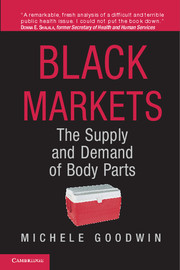Book contents
- Frontmatter
- Dedication
- Epigraph
- Contents
- Miscellaneous Frontmatter
- Preface
- Acknowledgments
- BLACK MARKETS
- PART ONE UNDERSTANDING THE STRAIN ON ALTRUISM
- 2 Institutional Supply, Demand, and Legitimacy
- 3 Nuances, Judicial Authority, and the Legal Limits of Altruism
- 4 Getting the Organ You Want
- PART TWO LEGAL FRAMEWORKS AND ALTERNATIVES
- PART THREE CRITIQUING THE SLAVERY AND BLACK BODY MARKET COMPARISON
- Notes
- Bibliography
- Index
3 - Nuances, Judicial Authority, and the Legal Limits of Altruism
from PART ONE - UNDERSTANDING THE STRAIN ON ALTRUISM
Published online by Cambridge University Press: 14 September 2019
- Frontmatter
- Dedication
- Epigraph
- Contents
- Miscellaneous Frontmatter
- Preface
- Acknowledgments
- BLACK MARKETS
- PART ONE UNDERSTANDING THE STRAIN ON ALTRUISM
- 2 Institutional Supply, Demand, and Legitimacy
- 3 Nuances, Judicial Authority, and the Legal Limits of Altruism
- 4 Getting the Organ You Want
- PART TWO LEGAL FRAMEWORKS AND ALTERNATIVES
- PART THREE CRITIQUING THE SLAVERY AND BLACK BODY MARKET COMPARISON
- Notes
- Bibliography
- Index
Summary
INTRODUCTION
This chapter analyzes the legal case history of organ and bone marrow transplantation. It asks how might judicial considerations be framed and what values are most essential to preserve in establishing a framework for compelled living donations? Currently, federally mandated altruism procurement constrains parents’ ability to seek alternative, viable sources for children needing organ or bone marrow transplants. The weaker, less desirable options become the exclusive options quite unnecessarily. This chapter argues that children and the mentally ill are not viable replacements for an incompetent, ineffective, organ procurement system. Their involvement is symptomatic of the deeply embedded procurement strains on altruism. Their participation should be limited to the narrowest possibilities.
The chapter focuses primarily on living donations, which means the donor is alive when she donates. This chapter explores a series of questions. How should courts respond to compelled living donation and reproductive altruism? How do we balance the desire to preserve life versus the desire to protect life from unnecessary harm and interference or intrusion? John Rawls’ analysis of a just society being bound in utilitarian ethics indicates morality and equity as being core principles of an optimally functioning legal and social system. How do such principles fit pragmatically in the context of organ and tissue donation, particularly with regard to children? This chapter scrutinizes these issues.
In keeping with the theme established in Chapter 1 and carried throughout, I argue that exclusive reliance on altruism to meet increasing demand for sophisticated, life-saving medical therapies forces strains on the altruistic organ and tissue transplantation system, and drives individuals to create unregulated, living-donor subsystems, some that are legal and others that are not. The altruism subsystems addressed in this chapter, compelled living donations, which demands organs from people either unwilling or incompetent to donate, and reproductive altruism, producing children specifically for organ and tissue harvesting, operate on principles inapposite to the legal values associated with altruism. These subsystems lack voluntary participation, informed consent, and mutual bargaining power, subverting the intention of altruism, with heightened possibilities for coercion, pressure, guilt, and unequal positioning. Thus, these systems are overshadowed by ethical, moral, and even legal doubts. The “gift of life” is a fallacy according to Siminoff and Chillag and perhaps they are right.
- Type
- Chapter
- Information
- Black MarketsThe Supply and Demand of Body Parts, pp. 57 - 84Publisher: Cambridge University PressPrint publication year: 2006



